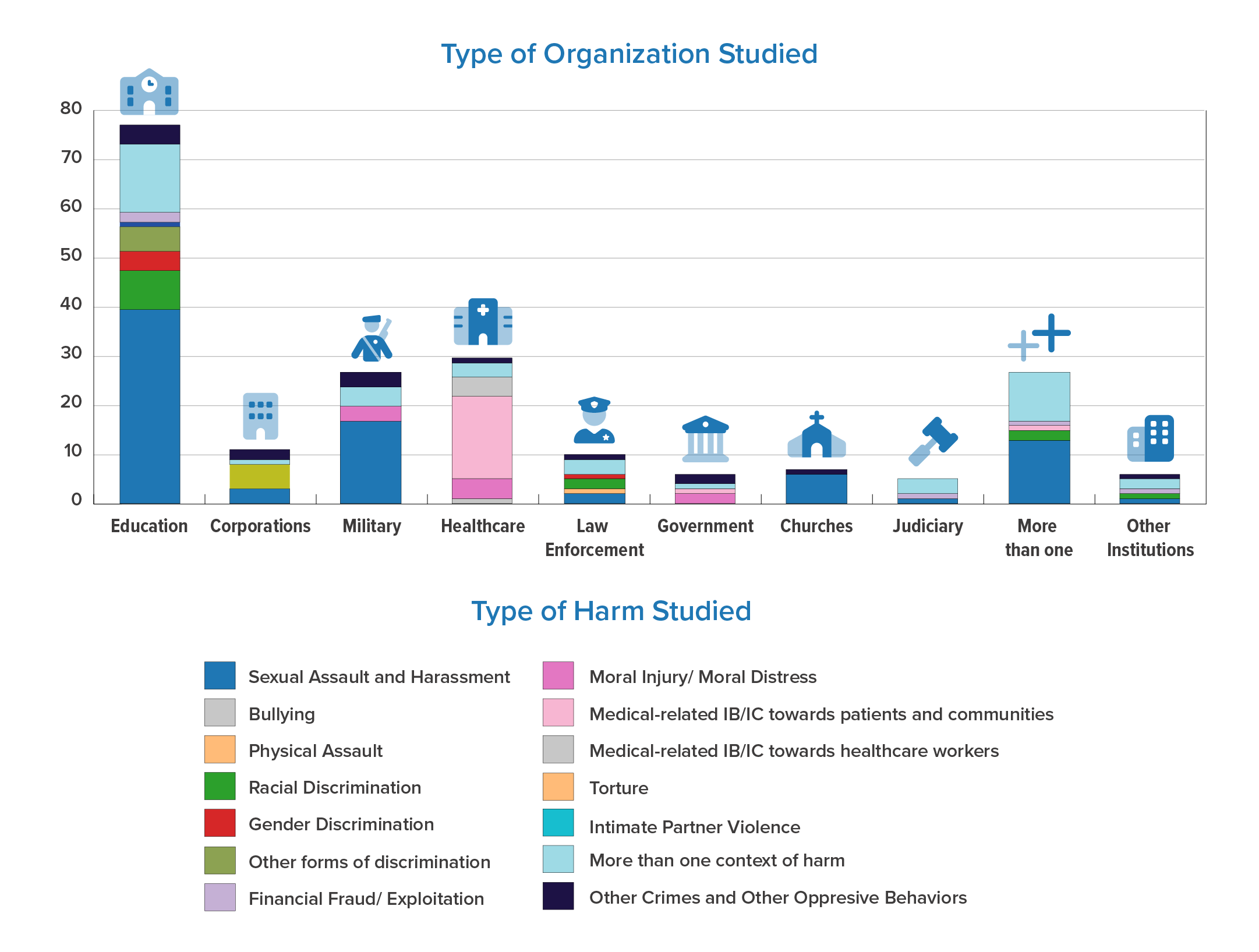Institutional Betrayal and Courage: Unearthing Trends, Gaps, and Opportunities in Research
By Aubrie L. Patterson
M.S.Doctoral Student, Interdisciplinary Health PhD Program
College of Social and Behavioral Sciences
Northern Arizona University
Last October, I wrote about a publicly accessible database we developed to track research on institutional betrayal (IB) and institutional courage (IC), highlighting current trends, gaps, and opportunities for further work. Today, I’m excited to share more information about the explosion of research in this area and our efforts to track it. Our hope is that this update will empower researchers and changemakers to navigate this database effectively.
Databases Updates Due to Proliferation of Research
Over the past few months, in small bursts of time between class readings, research proposals, presentations, and lab work, I have been searching for and downloading new literature that references either IB or IC. Dr. Jennifer Freyd had asked me to update the Courage Team’s research tracking database with literature published since Fall of 2023, which is when we first launched the project. I thought, sure, that’s easy! Until I quickly unearthed over 400 pieces of new, applicable published literature (and I continue to find more and more). On the one hand, this is wonderful: clearly, consciousness is spreading about the kind of power, for better and for worse, that institutional actions and inactions can have on a person’s wellbeing and ability to recover post-trauma. On the other hand, this surge of new research meant that we had to pivot away from the detailed tracking we started out doing to keep up with our goal of updating it every 6 months.
To sustainably catalog IB/IC-related research in this rapidly growing landscape, we changed our inclusion criteria to be more stringent. Whereas before we were including papers that briefly discussed either IB or IC, the Research Tracking Database is now strictly for empirical, theoretical, or summative literature where IB or IC represent a variable, finding, or central/ recurring topic. While these are mostly peer-reviewed, there is also gray literature and other works that are published outside of a peer review process. The purpose is for researchers and other professionals to see trends in current published work, either for narrowing down study topics or for finding strong references.
Recent Trends and Research Highlights
We have noted a few interesting trends in this recent group of literature, many of which are also captured in Christl et al. (2024)’s Scoping Review of Institutional Betrayal. For instance, as someone interested in studying religious trauma, I have been surprised at the relative dearth of research on IB in religious settings, which Christl et al. also noted. Kelly’s recent study A Comparative Thematic Analysis of Institutional Betrayal in the National Women’s Soccer League and the Catholic Church (2024) was published since the review and is a novel comparison of investigative reports.
One notable overall trend is that while there is still a focus on sexual assault in educational settings, IB and IC work does seem to be spreading into other areas. In fact, work related to sexual assault in the military is now tied with that in medical-related IB towards patients and communities. Another development is that nine new empirical or theoretical articles, that we have so far cataloged, are on racial, gender-based, or other forms of discrimination in various institutional settings. This includes Gómez’s “Institutional Courage to Change the World” (2023) from her book The cultural betrayal of Black women and girls: A Black feminist approach to healing from sexual abuse. This chapter is a guide to structural and systemic transformation and a change-making process she calls “dreamstorming” that focuses on institutional support for Black women and girls. We have also noticed an uptick in moral injury-related studies. Of those we have cataloged, there are an additional 13, including Levy and Gross’s “How moral injury and combat trauma drive political activism and societal reintegration among Israeli veterans” (2023), wherein they found that political participation can increase self-esteem and empowerment in veterans. Finally, there are enough studies exclusively on intimate partner violence (IPV) to warrant giving this its own category of harm in the research database. One of these is “Betrayed by the Blue: Intimate Partner Violence and Institutional Betrayal by the Criminal Legal System” by Blewitt, Hattery, and Smith (2023), a qualitative study detailing themes related to IPV victim/survivors who have made formal reports against their abusers.
On behalf of the Courage Team, thank you to all researchers and changemakers for continuing to advance IB/IC scholarship and advocacy. It is a great pleasure to read and track this incredible work.


